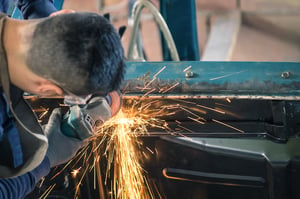
If you drive a car, chances are you’ve had an accident. From fender benders to more serious crashes, most everyone at some point needs a collision repair technician to get their car back in shape and up to par with the manufacturer’s specs.
Collision techs have a very distinct set of skills, which can include painting, welding, structural realignments, and panel bonding, along with a broad knowledge of specialized procedures and tools. They may operate solo or be part of a larger team.
If this sounds like exciting and challenging work, read on for a deeper dive into the collision industry.
What is the demand for collision techs?
As the world’s population continues to grow, so will the number of drivers on the road and the demand for cars. With this growth comes an increased need for repair technicians of all types.
The industry is expected to grow 4 percent over the next decade, partly as a result of these new cars, but also because of workers who retire or otherwise decide to leave the business. It’s a great time to get into the field, because companies all over the country are on the hunt for fresh talent to replace these departing techs. There are likely opportunities in your area, and some shops may even provide on-the-job training.
But be selective when choosing your future employer. You’ll want to spend your time working for a company that is a good fit for you, shares your values and takes care of its team.
What skills and training will I need?
A collision repair technician has a complex job—automotive technology is evolving at an ever-faster pace, with new materials, techniques, and advanced features for drivers coming out every year. Many of these innovations involve computer systems that require the tech to follow a specific series of diagnostic steps in order to analyze the problem and perform the repairs properly. Part of a collision tech’s day-to-day work involves researching and understanding these systems and closely following procedures.
You can learn a lot on the job, but it’s still recommended that new techs complete a vocational training program that meets collision industry standards.
Just as important as hard tech skills are “soft skills”—the way you carry yourself at work and how you operate as part of a larger team. These skills include:
- Self-discipline
- Hard work and promptness
- Ability to follow instructions
- Commitment to the team
- Courtesy to others in the shop
- Ability to research and interpret electronic data
- Excellent customer service
What kinds of jobs are available?
There are many disciplines within the collision field, including:
- Non-structural technician
- Steel/aluminum structural technician
- Refinish technician
- Estimator
- Auto physical damage appraiser
There’s no one way to fix a damaged vehicle, so your day-to-day work will vary widely depending on such factors as the location of the impact, the speed of the vehicle, and which parts of the car took serious damage.
Here’s a sample of tasks that a typical collision tech would be expected to do:
- Use basic hand tools to pound out small dents
- Straighten a full-frame or unibody vehicle with the help of benches and pulling and measuring tools
- Weld metal components together with MIG, TIG, or spot welds
- Repair slight imperfections that remain after panels are pounded out with plastic body fillers
- Replace a wide variety of damaged parts, including fenders. doors, and body panels
- Sand damaged surfaces to ensure a perfect refinishing job
- Utilize advanced software to match paint colors for touch-ups or a complete refinishing job
What kind of compensation can collision techs expect?
Wages in collision repair range from $42,730-$71,970 and have been on the rise for several years. Collision tech salaries are competitive with other skilled trades, and 31 percent earn $70,000 or more annually.
The collision industry needs you!
Collision repair is a career with great promise for dedicated young professionals who love to work with their hands and solve problems in a team setting. The skills needed to fill these positions will evolve as the automotive world continues to innovate and embrace technology. The industry needs techs who will learn these skills in school and graduate ready to tackle the evolving field of collision repair.




Comments